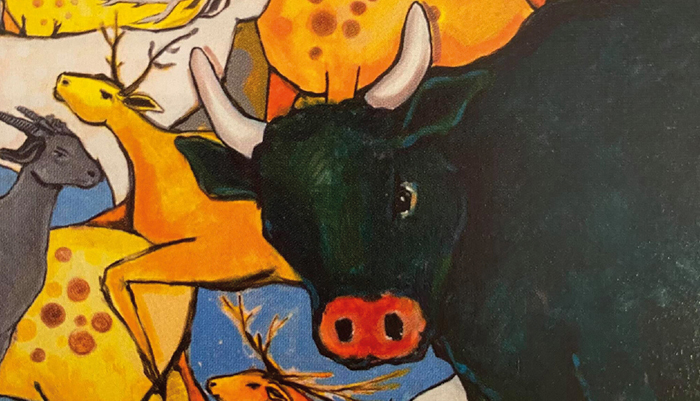Press Release
Postcolonial Ecologies opens with a presentation by the curators on March 9, 2021 at 6pm (Amman time). Unfolding through an exhibition, online residency, public program and Summer Academy, the exhibition project discusses and reflects on essential ecological questions, addressing how colonial practices and extractive economies have affected/contaminated the natural environments of indigenous peoples and native ecosystems.

Postcolonial Ecologies
Darat al Funun - Khalid Shoman Foundation, Amman (Jordan)
09.03 - 30.09.2021

Exhibition March 9 -
Departing from the epistemic violence enacted through dominant technologies of measurement and calculation that subdue life forms to market logic, Postcolonial Ecologies unearths indigenous knowledge systems rooted in conceptions of nature and land as sources of life and subsistence. Thinking with Frantz Fanon, participants are invited to engage in critical readings of decolonization and to speculate on life futures that acknowledge land as "the most essential value," its humus at once a carrier of collective memory/trauma and a site of anticolonial resurgence and regeneration. Against a modern grammar of predation and extraction, the multifaceted program invokes other worlds in the making, exploring radical forms of social organisation that centre mutual aid and more-
Curators: Joud Al-
Exhibition
Featuring works from the Khalid Shoman Collection, the main exhibition opens on May 22, 2021 in the Main Building, Darat al Funun at 6pm. Participating artists include Ali Jabri, Ahmad Nawash, Amal Kenawy, Asunción Molinos Gordo, Etel Adnan, Gouider Triki, Jananne Al-
The exhibition will also feature works from outside the collection, including commissions by local artists responding to the conceptual framework of the project. The full line-
The Lab Residency
As part of the online activities under Postcolonial Ecologies, a web residency will be taking place between March 1-
Resident artists include Mays AlBeik, Nadine Fattaleh and Ali Eyal.
Public Program
The exhibitions will be accompanied by a range of learning activities and discursive events including lectures, seminars, workshops and performances designed to facilitate interdisciplinary dialogue and carve up new spaces for engagement, conversation and exchange.
The public program also features a collaboration with our current fellow, Kareem Estefan, who has been invited to curate a monthly series. Positioning the speculative practice of worldbuilding as a poetic act of repairing present and future ecologies in the wake of imperial violence, this series will present artists, writers, and scholars who think beyond “green futures” to imagine a world transformed by decolonization and de-
Invited guests include T. J. Demos, Muna Dajani, Vivien Sansour, Maryam Monalisa Gharavi, Nadya Sbaiti and many more.
Summer Academy : Darat al Funun’s upcoming Summer Academy program will be taking place from June 1-
The academy offers participants the space to develop their art practice within a critical setting that encourages experimentation, knowledge-
The two month program comprises three different chapters: Rewilding Pedagogy, Witnessing and Worldbuilding in the Wake and The View from “No Man’s Land.”
Rewilding Pedagogy takes the act of "rewilding" as its point of departure, rewilding the soil from the ravages of monoculture agriculture, and rewilding local knowledge cultures from colonization and encroaching neoliberalism. It is an approach for envisioning new networks, systems, and processes that can mediate new spatial and social configurations essential for new political, socio-
Witnessing and Worldbuilding in the Wake explores theories of witnessing that look beyond the discourses of social trauma and international law, drawing instead from artistic and social practices of “fabulation,” “speculation,” and “worldbuilding.” Attuning ourselves to the distinct temporary conditions of disaster experienced by different communities, we will seek modes of “witnessing as worldbuilding” that challenge the “capitalist realism” identified by the British cultural critic Mark Fisher, in which “it is easier to imagine the end of the world than the end of capitalism.”
The program concludes with The View from “No Man’s Land,” which looks at post-
Darat al Funun -
2018 marked the 30th anniversary of the Foundation. The story goes back to 1988, whith an initiative to support the arts and artists of Jordan and the Arab world. Today, it is a home for the arts housed in six renovated historical buildings and warehouses, with a restored archaeological site in the garden. Darat al Funun actively pursues its mission in providing a platform for contemporary Arab artists. It support art practices and artistic exchange. The Foundation stimulate critical discourse and research with a fellowship for the study of modern and contemporary Arab art launched in 2011. The Lab is open to projects by emerging artists. It program educational activities for young people and students, including the annual Summer Academy. The art library, publications, films, and digital archives are open for research and documentation.
Mohammad Hawajri, Animal Farm, 2012. Acrylic on Canvas, 203 x 191 cm.


© ArtCatalyse International / Marika Prévosto 2021. All Rights Reserved